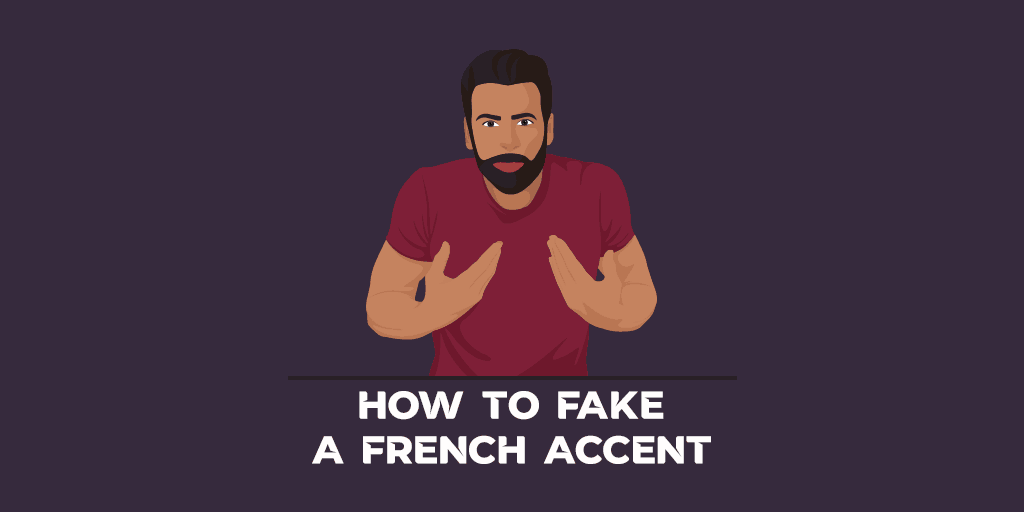The French accent is a significant way to distinguish between native speakers and those still learning the language. There are ways, however, to fake a French accent so you can fit right in with the locals.
The accent is very distinct as compared to other languages – speaking with the accent also helps for improving your French-speaking skills.
This guide will also be helpful for actors who wish to learn how to speak with a French accent for roles they'll be portraying. Best of all, this guide is for fun! If you simply wish to learn how to fake a delightful French accent, read on!

French accents around the world
There isn't just one version of French – there are approximately 270 million people who speak French either as their first or second language. There are countless more who are learning French to use while traveling, work, or other personal reasons.
France isn't the only place with native French speakers. People speak French all around the world, and as you can imagine, it varies slightly depending on the location. Other places where you'll find French widely spoken include Canada, French territories, and countries in Africa such as the Reúnion Islands, Djibouti, and Côte d'Ivoire.
So out of the 84 'la francophonie' countries (or French-speaking countries), which accent should you learn?
The standard for learning French remains Parisian French. As the capital of France and where most of the language originated, speaking with a Parisian-French accent allows you to easily communicate with speakers no matter where they're from.
See also:
Ways to fake a French Accent
Successfully faking a French accent involves understanding specific aspects of the language to apply the accent correctly. French speakers have a unique way of pronouncing vowels and words, using different parts of their mouths or face to produce sounds only found in French.
Once you understand these characteristics, you'll have the perfect French accent, whether speaking in French or using a French accent in your language!
The French 'R'
The r-sound is one of the most distinguishing factors for faking a French accent. French has two types of r's used in the language: the basic 'r' pronunciation and a uvular trill sound.
Basic 'R'
The 'r' sound in English is usually pronounced as 'are' or ‘er.' In French, or with the French accent if you will, it's pronounced 'air.'
Example: Super
Uvular Trill' R'
The French rarely pronounce the r-sound as we do in English. The letter produces a sound involving a uvular trill, a skill you should learn if you want to perfect the French accent. The sound comes from the back of your throat with air moving past your uvular to make it vibrate.
The uvular trill is helpful when using a French accent to say English words to sound like a native French speaker.
The 'th' sound
French has sounds that aren't found in other languages, as well as there are sounds in other languages not found in French. One such sound used frequently in English is the th-sound.
Since the th-sound is absent from the French language, native speakers replace it with a z-sound. It's essential to use when practicing a French accent with English words for producing an authentic accent.
For example:
Silent 'H'
In French, you'll see a lot of words with the letter 'H' in their spelling, but when you say them aloud, the 'H' is silent.
For example:
You would pronounce 'L' hopital' as 'l' opital' and 'hor d 'oeuvres' as 'or d' oeuvres."
If you want to fake a French accent in English, you also have to make the 'H' in every word silent.
For example:
You would pronounce 'hair' as merely 'air' or 'hamburger' as 'am-bair-gair.'
See also: French Silent Letters
Nasal sounds
Another distinct element of the French language includes the use of the nasal when producing certain sounds. The element that most learners find difficult with the French accent. These nasal sounds are common when using the words:
Each of these words sounds more closely like 'un,' but has different meanings. Beginning French speakers find it difficult to tell the difference between each, but once you master the sound, you'll sound like a native speaker in no time.
See also: French Pronunciation Guide for Beginners
How to improve your French accent?
It takes a bit more than reading about the French accent to be able to 'fake it till you make it.' As with everything else in learning a new language, you have to practice it a bit to truly sound like a native French speaker.
Now that you have an idea of some of the things to keep in mind to produce a French accent, you can keep them in mind while using the following accent-learning strategies:
Listening
The best way, by far, to learn the French accent is by listening to native-speakers using it in regular conversations. Listening helps you to pick up how words are said, the tone, pace, emphasis, and much more that you typically wouldn't get from merely reading it.
In case you can't sit around a café all day in Paris and listen in on the local conversations, you can always find a great movie or music to listen to. There are plenty of French listening exercises to hear native speakers talking to each other.
Check out these free resources from Talk in French:
Watching
You can produce a lot of the French accent by the way that you say words – how you hold your mouth, where you place your tongue, how air flows with your pronunciations. Many of these subtle techniques involve "watch" how someone speaks French.
Most French-speakers talk with a small mouth, typically pursing their lips together to pronounce many words.
Sometimes, holding your mouth the correct way is just enough to fake a French accent. It will surely help with word pronunciation.
These articles might help:
10 Essential French Movies to Watch Before Heading to Paris
How to Learn French with Movies in 7 Easy Steps (+ Free Movie Recommendations)
Practice with French Cognates
Did you know that there are more than 1,000 words in French that are spelled and mean the same thing in English? The biggest difference is how you pronounce each word.
French cognates are a great place to start with learning the French accent since the words are so similar in both languages. If you keep in mind the characteristics of the French accent mentioned above and say them in a way like you see native-speakers talking, you will have a better chance at faking the accent.
Conclusion
Faking a French accent is excellent when first learning to speak the language. Learning the accent helps you say words in their correct pronunciation, and the practice is great for better comprehension of French.
Hope this article helps you learn how to do a French accent! Let us know in the comments some of the ways you practice faking a French accent.
Here are some FAQs about Fake French Accent
How can I do a French accent?
Being able to mimic a French accent takes practice, naturally. Reading and listening can only take you so far, although, yes, please listen to as much authentic French as possible. French movies, music, and audiobooks are a great way to start.
Make sure to take note of how the mouth, tongue, lips, are shaped to make certain noises. With practice, you can do a French accent!
Why is the French accent so attractive?
It’s less to do with the accent, and more to do with the French culture. When we watch movies and media featuring French culture, it is often portrayed in a sexy way. As such, anything to do with the French comes across as attractive!
So practice your French accent! It will sound attractive to your non-francophone friends, and more fluent to francophones.

